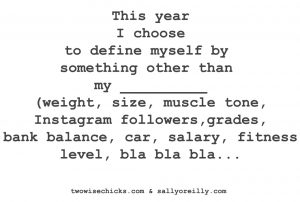It’s been quite an emotional year hasn’t it? No doubt this year brought with it its challenges on a personal level, and as for the macro level – it seems like many of our most talented people have died and left us reeling. My most shocking was Prince, you? And I’m all for the idea of cryogenically protecting David Attenborough until 2017 by the way..

And now we’re at a hazardous part of the year – the New Year’s Resolutions part – and I do believe that resolutions can be hazardous to your health, both mental and physical.
You may not believe it, but it’s true. And I’m not just talking about the effects of Yo-Yo dieting.
My colleague Tanya and I wrote this piece for the big day last year and I feel so strongly about it that I’m reposting this year.
Here we go:
We cannot tell you how many times we have sat face-to-face with a client who is sharing their shame or feelings of unworthiness because they have (in their words) “yet again failed”. Failed to make good on their resolution(s) for the New Year. Failed to lose weight, get fit, be more charitable, be a better parent, be more popular, or even to stop using foul language.
The weight of these feelings is palpable.
The feelings are real. The body language is slumped, shrunken.
Our clients didn’t just ‘fail’ to achieve the goal they set themselves – they have somehow ‘become’ their perceived failure. Given that a full 60% of people have dropped their resolution(s) by the 6-month mark (and that statistic is very conservative) you can see how many people are affected – emotionally speaking – each year by ‘failed’ resolutions.
Of course we as therapists (being humans) have struggled in the past with this very feeling, so we can usually empathize on a personal level with our clients. Thankfully, years ago (and unbeknownst to each other) we dropped the habit.
What is a resolution, anyway? It’s defined as “A firm decision to do or not to do something”. So, on or about New Years Eve, we set goals – resolutions – usually aimed at changing ourselves for the better. Usually in earnest.
It’s a good thing – right?
Now, in theory there is absolutely nothing wrong with setting a goal to be a better version of yourself. The PROBLEM is that goal-setting is not the ONLY factor necessary for achieving our goals (e.g. ‘Resolutions’). The difficulty arises when we set goals that are just not S.M.A.R.T. (Simple, Measurable, Achievable, Realistic, Tangible). For example – “I’ll eat better, run every single day and run that marathon by Easter, come in the top three, attract my ideal partner, get really popular and win lots of praise”. Not S.M.A.R.T. at all…
To add to that, we often set goals that are fundamentally linked to a negative belief we are carrying around with respect to our own self-worth. Like – “I’m useless, I don’t exercise enough, and that keeps me ugly / unattractive, fat / unlovable etc”
Sometimes it’s both.
How do negative beliefs about self-worth impact New Years Resolutions?
The resolutions we pick reveal more about how we value and judge ourselves and our worth than we may realise. Just take a moment now to think back on past resolutions you have made (you might see the truth in that for yourself).
If we set a goal that is fundamentally tied to our self-worth – and if we do not achieve that goal 100 percent – we do not just fail at achieving that goal, we ARE, by our own definition, a failure (and perceive ourselves as such). And worse, that belief is now even more entrenched than before we ‘resolved’ to change!
Add to that, most of us resort to ‘all-or-nothing’ (dichotomous) thinking. One small slip leads us to think “back to square one..” and all the disappointment and judgement that goes with that.

We as humans are not good at allowing mistakes. Particularly not in ourselves.
The whole thing can be a recipe for epic self-esteem crash-and-burn disaster!
So, it is very important to frame our resolutions around how we desire to be, while maintaining a healthy sense of who we are.
RESOLUTION:
(see what we did there?)
Here’s a New Years Resolution that truly is “One Size Fits All”:
“This year, I resolve to act, think and feel in ways that reflect one simple belief:
I am worthy.”
If you are uncomfortable with your current weight, resolve that you are worth the effort to make healthier choices regarding diet and exercise.
If you are trying to quit smoking, resolve to make choices that reflect that you are worth taking care of your health. Reducing your habit by even one cigarette a day is a success and reflects your ultimate goal.
If you desire a better career, resolve to believe you are capable of applying for more senior positions, or indeed to take a night class.
Try these “I AM” self worth statements out and consider making choices that support them (and so, support you!). Pick a statement (or create your own) and try it on for size:
- I AM… worth taking care of my health
- I AM… a hard worker, and I continue to work hard towards my goals
- I AM… capable of, and willing to making good/healthy choices in life
- I AM… my own person
- I AM… trustworthy
I. Am. Worthy.
The rest will follow. Promise. Because to a person with self-worth, there is no such thing as failure – only opportunities for learning and change.
We’d love to hear your thoughts about setting New Years Resolutions. What is your experience? What has worked, what hasn’t? Feel free to comment below or on FB or Twitter!

(…you are TOTALLY worth it!)
Warmly,
Sally and Tanya

